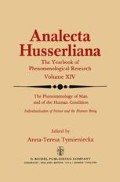Abstract
The purpose of this essay will be to grasp as a whole the narrative kinds of discourse ranging from the most “fictional” such as tales, romances, dramas, novels, and movies, to the most “empirical,” including histories, biographies, and autobiographies.1 To put this problem in terms that Wittgenstein has made popular among philosophers, I want to attempt to grasp all these narrative modes as a unique “language-game.” And following Wittgenstein’s example, this means to refer it to some “form of life.”2
Access this chapter
Tax calculation will be finalised at checkout
Purchases are for personal use only
Preview
Unable to display preview. Download preview PDF.
Notes
Regarding the “oral heritage of written tradition,” see Scholes and Kellogg, The Nature of Narrative, chap. 2, pp. 17–56, and Albert Lord, The Singer of Tales (Cambridge: Harvard University Press, 1960).
The subtitle of Goodman’s book Languages of Art (Indianapolis, The Bobbs-Merrill Co., 1968) is An Approach to a Theory of Symbols.
See, for example, Hay den White, “The Historical Text as Literary Artifact,” Clio 3 (1974): 277–303.
Ibid.,p. 13.
Ibid., p. 22.
Author information
Authors and Affiliations
Editor information
Rights and permissions
Copyright information
© 1983 D. Reidel Publishing Company
About this chapter
Cite this chapter
Ricoeur, P. (1983). Can Fictional Narratives be True?. In: Tymieniecka, AT. (eds) The Phenomenology of Man and of the Human Condition. Analecta Husserliana, vol 14. Springer, Dordrecht. https://doi.org/10.1007/978-94-009-6969-8_1
Download citation
DOI: https://doi.org/10.1007/978-94-009-6969-8_1
Publisher Name: Springer, Dordrecht
Print ISBN: 978-94-009-6971-1
Online ISBN: 978-94-009-6969-8
eBook Packages: Springer Book Archive

